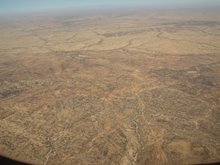Uganda's Columbia University Professor is back again with another broadside on the international community's efforts in Darfur.
"‘The AU has become part of the conflict,’ Mohamed Saley, the leader of the JEM splinter group that allegedly abducted the AMIS patrol in October 2005, told Reuters at the time. ‘We want the AU to leave and we have warned them not to travel to our areas.’ Trying to keep the peace in the absence of a peace agreement made the AU ‘part of the conflict’. There is no reason to believe that the fate of the UN will be any different. To strengthen the mandate in the absence of a political agreement is more likely to deepen than to solve the dilemma. To enforce the ceasefire will mean taking on the role of an invading – and not a peacekeeping – force. Darfur, which is a bit smaller than France – and larger than Iraq – will surely require a force of more than the 26,000 currently planned by the UN."
And more specifically on my favoured theme, the inclusion of Sudanese institutions in the relief effort:
"Local voluntary organisations were critical of the growing dependency of IDPs on international NGOs. The representative from El Fasher Call made the point with some bitterness: ‘IDPs are trying to endear themselves to international NGOs but don’t want to deal with national NGOs.’ ‘IDPs don’t believe in anything Sudanese any more,’ a representative from a Fur charity added. One participant from a construction NGO observed that the war had made people adopt a ‘consumer mentality’. The disaffection with INGOs was shared by all local voluntary organisations, regardless of their ethnic affiliation or political inclination. ‘National NGOs lack the capacity to provide necessary services,’ a representative of Sudan Development Organisation explained, not least because they are excluded by INGOs: ‘They make no attempt to acknowledge that we know the ground better, and also the demands of the people. No wonder most national NGOs have been rejected by the IDPs. If international NGOs gave us a chance, people might appreciate us more.’"
Full article available here, http://www.pambazuka.org/en/category/features/43158
Subscribe to:
Post Comments (Atom)

No comments:
Post a Comment